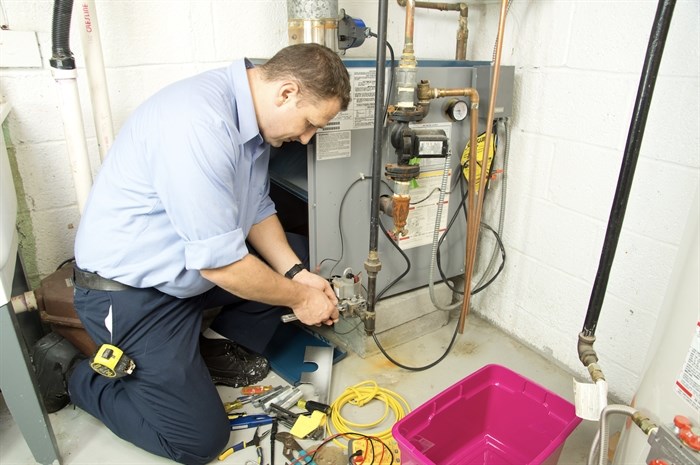FortisBC could be heating B.C. homes with gas from garbage by 2050
FortisBC is a North American leader in supplying renewable natural gas and, a new study shows, could have enough renewable natural gas to heat the homes of all of its customers by 2050.
What’s called renewable natural gas is, mostly, methane collected and cleaned from things like garbage dumps, sewage treatment plans, manure piles and wood waste.
Right now, only one per cent of the gas supplied by FortisBC comes from such sources but it’s ramping up quickly with a target of 5% in the next couple of years, 10% by 2025 and 15% by 2030.
“As one of the first in the market we’ve been able to get a number of contracts and we’re still working with potential suppliers,” Jason Wolfe, director of energy solutions for FortisBC, told iNFOnews.ca. “We think, for our needs in B.C., there’s going to be adequate volumes to meet all our needs.”
Wolfe made those comments earlier this week, saying the company’s target was 75% renewable by 2050.
Since then, the results of study on potential sources of renewable natural gas in B.C. has come out, showing there’s enough domestic supply to raise the bar to 100% by 2050, according to an email from the FortisBC communications office. They added that the 75% target could be increased some time in the future, based on the new information.
The company supplies natural gas to most parts of B.C. and electricity to the Central and South Okanagan and Kootenays.
FortisBC owns processing facilities at Kelowna’s Glenmore Landfill and in Salmon Arm where gases are captured from the garbage piles, cleaned up and the methane, or renewable natural gas, is fed into FortisBC’s pipelines.
It has five contracts with suppliers in B.C. that include EverGen Infrastructure Corp. It owns Fraser Valley Biogas with a plant near Chilliwack producing gas from manure and food waste. FortisBC also has contracts with the new Delta landfill in Vancouver and gets gas from the Lulu Island Wastewater Treatment Plant in the Lower Mainland.
It’s also expanding a wood waste processing plant near Trail and has six other contracts with suppliers outside B.C., including one in Alberta producing gas from manure and other suppliers from as far away as the Eastern United States.
FortisBC started working on renewable natural gas about 12 years ago, Wolfe said. It has taken years to research, find sources and build a business and billing model but it’s now the first utility in North America to actually supply it to customers.
There is a higher cost to the renewable gas so customers have been offered the chance to support the renewable natural gas program by signing up and paying an extra fee to cover the cost of the gas in their homes. That doesn’t mean, if they sign up for 10% of their gas to be renewable that they actually get 10% renewable gas in their homes since it’s all put in the same pipeline. But, Wolfe said, some people are supportive of the idea of cutting greenhouse gas emissions so they are willing to pay extra to help make it happen.
Eventually, as the program rolls out, any extra cost for renewable natural gas will be spread throughout all customers.
Normal natural gas is getting some push back from environmentalists who are concerned about such practices as fracking that is used to produce it.
While renewable natural gas creates less carbon dioxide than burning oil or coal, if left to escape into the atmosphere, it can be more harmful than carbon dioxide in terms of greenhouse gases so it can have a larger impact on climate change.
“One of the beauties of renewable natural gas is that methane that might be from a landfill or decomposing matter is captured, so it’s not venting,” Wolfe said. “It is being consumed in people’s furnaces so, overall, you are net negative in emissions as a result.”
FortisBC has applied to the province to require all new housing to be 100% heated (or cooled) with renewable natural gas.
This comes at a time when the province is cutting the provincial sales tax on electric heat pumps and boosting the tax on gas furnaces.
Some critics have said the heat pumps are not suitable for colder climates in B.C.’s Interior.
READ MORE: PST hike on gas-fuelled home heating appliances leaves B.C. Interior out in the cold
From Wolfe’s perspective, both gas and electric heat are needed.
“This application we put in proposing 100% renewable gas for all new residential connections, that ensures that, if they’re in an area that heat pumps make sense or they want a heat pump, they can choose that,” he said. “But it also provides an option for those customers to use furnaces or boilers with renewable gas.”
See more on FortisBC’s renewable natural gas program here.
To contact a reporter for this story, email Rob Munro or call 250-808-0143 or email the editor. You can also submit photos, videos or news tips to the newsroom and be entered to win a monthly prize draw.
We welcome your comments and opinions on our stories but play nice. We won't censor or delete comments unless they contain off-topic statements or links, unnecessary vulgarity, false facts, spam or obviously fake profiles. If you have any concerns about what you see in comments, email the editor in the link above.




